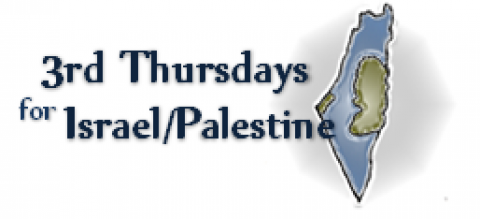
Organizations in the Faith Forum on Middle East Policy send out action alerts monthly, focusing on different issues so that members of Congress hear consistently that their constituents support a just and lasting resolution to the Palestinian and Israeli conflict.
Call for a lasting ceasefire between Gaza and Israel and an end to the Gaza blockade
"One thing we are going to need, medium- and long-term …is a completely new strategy toward Gaza.” Tony Blair, Middle East peace envoy, New York Times, March 13, 2014
On March 11 three Palestinian members of Islamic Jihad were killed in southern Gaza, with their deaths reportedly attributed to an Israeli airstrike. The next day, Gaza fighters launched dozens of rockets into southern Israel, and the Israeli military conducted numerous airstrikes on Gaza. Rockets and airstrikes continued later in the week.
The latest violence takes place following recent Palestinian civilian casualties in Gaza. In a March 4 report, “Spike in number of Palestinian civilians killed near Gaza perimeter fence,” the Israeli human rights organization B’Tselem describes incidents of civilian deaths, including that of Amneh Qdeih:
Amneh Qdeih, 57, a resident of the town of Khuza'ah, was killed on Friday, 28 February 2014. She died of a gunshot wound to her abdomen fired at her when she approached Gaza's perimeter fence. Her relatives told B'Tselem field researcher Khaled al-'Azayzeh that Qdeih, who was mentally ill, had been at a family wedding in the town of Khuza'ah, not far from the perimeter fence in the southeastern Gaza Strip. She did not return home with the rest her family, and when they realized she was missing, they began searching for her. At around 10 PM, her family heard gunshots, saw the light flares in the sky and noticed a [Red Cross] jeep near the fence. At around 6 AM, they found Qdeih's body close to the perimeter fence, directly across from an Israeli military watchtower. Qdeih had sustained a gunshot wound to her abdomen. It is not clear whether she was killed instantaneously or bled to death for hours. The Israeli Defense Force (IDF) spokesperson told Israeli daily Ha’aretz that an IDF force fired at a person who was approaching the perimeter fence in the southern Gaza Strip and did not heed their calls to halt. The unit reported it had a confirmed hit on the target. The IDF spokesperson did not explain why Qdeih was not given medical treatment that might have saved her life.
Also in March, the European Union released its report on Gaza. It details deteriorating conditions for the area’s 1.7 million Palestinian residents. Power outages last up to 16 hours per day. Fuel shortages result in severely compromised water and sanitation facilities and disruption to hospital services. The water situation is particularly dire, as the report details: “As a result of over-abstraction of water from the aquifer—the principal water source in Gaza—the groundwater level has been sinking. This causes salty seawater to seep in, rendering 90 percent of the aquifer’s water unsafe for drinking without treatment. According to a UN study, the aquifer may become unusable by 2016 and damage to it may be irreversible by 2020.”
The EU Heads of Mission warn that “the human rights situation in Gaza is worrying":
A range of violations of human rights and fundamental freedoms has been recorded including as regards freedom of movement, freedom of expression, and peaceful assembly. Both the Israeli authorities in their capacity as occupying power and the de facto authorities have responsibility for safeguarding human rights in Gaza.
The ongoing closure policy means that movement and access for Palestinian residents of Gaza is strictly limited: “Israeli forces have continued to close Erez crossing to Palestinian civilians, thus preventing people in Gaza from accessing holy sites in Jerusalem and Bethlehem, studying in universities in the West Bank, and visiting their families and relatives in the West Bank and vice versa only allowing passage with special permits in exceptional cases.”
The report notes a lower number of rockets in 2013 than in previous years, but “indiscriminate firing of rockets towards Israel by extremist groups in Gaza has continued, in violation of international law.”
The report concludes that the policy of closure has not effectively addressed security concerns, with tunnel traffic allowing weapons materials into Gaza and also providing a source of tax revenue to “Hamas and other armed groups.”
The recent deaths of Palestinians in Gaza and the firing of rockets into Israel, as well as the deteriorating living conditions there, demonstrate in tragic way that the blockade of Gaza is suffocating for its residents while not bringing security for Israel. As energy and attention focus on the ongoing peace negotiations, it is also critical to address the Gaza situation.
While Israel, as the occupying power, bears primary responsibility for ending the blockade, the Palestinian Authority and the de facto leadership in Gaza also must be held accountable. While the Egyptian government has taken measures to curtail tunnel traffic, they should also be encouraged to work with the parties to facilitate use of the Rafah crossing between Egypt and Gaza.
In 2005 Israel and the Palestinian Authority signed an agreement on movement and access contained in two documents, “Agreement on Movement and Access,” and “Agreed Principles for Rafah Crossing.” This agreement should be immediately updated and implemented, to alleviate the suffering and collective punishment of the people of Gaza and to provide for the security of the people of southern Israel.
The need is urgent for a lasting ceasefire and an opening of the monitored crossings for humanitarian assistance, transit of persons, and imports and exports for the Gaza economy.
It is time for a new strategy toward Gaza – a strategy that is based on human rights, international law, and respect for the dignity, freedom, and security of all persons.
Contact your elected officials today. Click here to urge your representative and senators to press for a lasting ceasefire and a lifting of the Gaza blockade.
